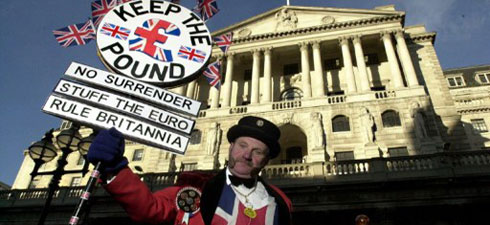Very rarely in political history has any faction or movement enjoyed such a complete and crushing victory as the Conservative Eurosceptics. The field is theirs. They were not merely right about the single currency, the greatest economic issue of our age — they were right for the right reasons. They foresaw with lucid, prophetic accuracy exactly how and why the euro would bring with it financial devastation and social collapse.
Meanwhile the pro-Europeans find themselves in the same situation as appeasers in 1940, or communists after the fall of the Berlin Wall. They are utterly busted. Let’s examine the case of the Financial Times, which claims to be Britain’s premier economic publication. About 25 years ago something went very wrong with the FT. It ceased to be the dry, rigorous journal of economic record that was so respected under its great postwar editor Sir Gordon Newton.
Turning its back on its readers, it was captured by a clique of left-wing journalists. An early sign that something was going wrong came when the FT came out against the Falklands invasion. Naturally it supported Britain’s entry to the Exchange Rate Mechanism in 1990. In 1992, under the slow-witted editorship of Richard Lambert (in a later incarnation, as director general of the Confederation of British Industry, Sir Richard was to become one of the most sycophantic apologists for Gordon Brown’s premiership), it endorsed Neil Kinnock as prime minister. It has been wrong on every single major economic judgment over the past quarter century.
The central historical error of the modern Financial Times concerns the euro. The FT flung itself headlong into the pro-euro camp, embracing the cause with an almost religious passion. Doubts were dismissed. Here is the paper’s supposedly sceptical and contrarian Lex column on 8 January 2001, on the subject of Greek entry to the eurozone. ‘With Greece now trading in euros,’ reflected Lex, ‘few will mourn the death of the drachma. Membership of the eurozone offers the prospect of long-term economic stability.’ The FT offered a similar warm welcome to Ireland.
The paper waged a vendetta against those who warned that the euro would not work. Its chief political columnist Philip Stephens consistently mocked the Eurosceptics. ‘Immaturity is the kind explanation,’ sneered Stephens as Tory leader William Hague came out against the single currency.
Even as late as May 2008, when the fatal booms in Ireland and elsewhere were very obviously beginning to falter, the paper retained its faith: ‘European monetary union is a bumble bee that has taken flight,’ asserted the newspaper’s leader column. ‘However improbable the celestial design, it has succeeded in real life.’ For a paper with the FT’s pretensions to authority in financial matters, its coverage of the single currency can be regarded as nothing short of a disaster. Read full article in The Spectator...
This article is based upon a report entitled Guilty Men, by Peter Oborne and Frances Weaver, to be published by the Centre for Policy Studies.
Netherlands
Wilders shifts his target to Europe
"Europe" has become the new scapegoat for Geert Wilders, leader of the PVV (populist right), writes Lex Oomkes, political commentator of Trouw. What emerged from the “verbal violence” of the populist leader during the budget debate at the National Asembly, Oomkes notes, “is that Wilders is gradually replacing Islam, integration and the nuisances of urban youth of Moroccan origin with 'Europe' as an imminent threat.
“Clearly, the fight against the Islamisation of the Netherlands is the raison d’être of the PVV,” Oomkes adds. “But 'Europe' can give Wilders so much more. Now that the crisis is deepening by the day and all the proposed solutions seem to result, in one way or another, in more handouts from Dutch taxpayers, Europe has taken on an immense symbolic value."
It’s an approach that appears to have infected the other parties, says the journalist: “The political establishment has become vulnerable to this strategy. But even with the 'deaf and blind elite', to quote Wilders, there is no question of a European ideal. And if any member of an established party still thinks in terms of European ideals, he will look around three times before speaking.”
Was this article useful? If so we are delighted!
It is freely available because we believe that the right to free and independent information is essential for democracy. But this right is not guaranteed forever, and independence comes at a cost. We need your support in order to continue publishing independent, multilingual news for all Europeans.
Discover our subscription offers and their exclusive benefits and become a member of our community now!












